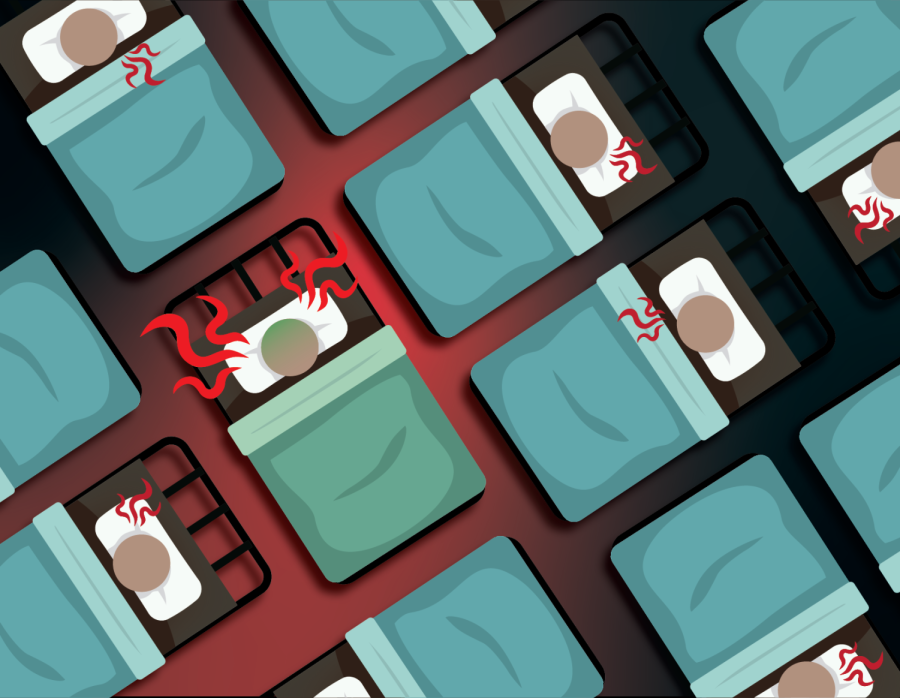Loken: Racism is Tanking Quality of Care in Hospitals
(Design by Cecilia Acosta | The Daily Utah Chronicle)
June 30, 2023
The COVID-19 pandemic brought long-held, festering prejudice to the surface of every field of employment. The healthcare industry is a space where we can least afford racialized hierarchies to hinder effective work. People are reluctant to address race at all, fearing a challenge to racist force will be understood as a devaluation of white people.
Racist ideas justify policies that also impact white people. When the impulse to individualize conflict serves to frame personal failure as unrelated to institutional harm, white people are hurt by racism, too. If we care about our sick and elderly, we ought to indicate we want low employee turnover and manageable patient ratios. We want our physical well-being to be in the hands of people who have their own needs met. To increase their quality of care, hospitals must engage in antiracist hiring practices and respond to racialized abuse.
Perception of competence is often racialized, but we can make a structured and intentional effort to work against racial biases and stereotypes. An inclusive environment stands to benefit all. For example, if hospitals facilitated communication accommodation training, people who learned English as a second language and people with disabilities affecting their speech would better engage in their own healthcare. It could help healthcare workers who learned English as a first language realize a spoken accent isn’t a reason to disregard other healthcare workers. This disregard is so widespread, it creates a set of accepted racialized interactions to filter out people who speak English as a second language — a mechanism of systemic racism. A systemic problem demands structural solutions.
Immigrants and people of color belong in healthcare but rarely are they welcomed, let alone sought out. When differences are embraced and not put down, those who move through the world in similar ways to their patients are empowered to enhance those patients’ level of care.
“I don’t think I was treated differently because I think there was diversity,” said Arlene Weglinski, a Filipino-American immigrant who worked as a computer engineer before moving to New York City. But Weglinski had to prepare for a different environment in Utah: “Before we moved here to Utah, we heard that this state is a white state, that it’s hard to be here, because I don’t think they like you. … You don’t feel like you’re welcome. … I was so worried about moving to Utah.”
When she applied to nursing school, her supervisor agreed to write a letter of endorsement for her. But this supervisor went out of their way to write that someone whose English posed a language barrier shouldn’t attend nursing school. “I realized I cannot like lean or trust that she will endorse me, for me to go to school,” said Weglinski.
Weglinski detailed the difficulty of finding a job after obtaining her degree in nursing. She observed, “People have a stereotypical view of you when [you’re] at work.” She applied for one job through a personal connection. “Luckily, I got the position. So they said, we’ll just have to see if I survive because I’m quiet. But then I kind of surprised them, because I even became the Nursing Supervisor. And after all, I became a Wellness Administrator.”
I am thankful she became the graduate-degree nurse practitioner she is today, despite the racism she faces. She is contributing to Utah’s healthcare scene as a Wellness Administrator and instructor. She holds multiple degrees in nursing and is seeking to obtain a doctorate in nursing soon. Clearly, her intelligence and competence empower her as a nurse. Her English is understandable to the extent she can teach how to care for others, which further highlights the thinly veiled prejudice of her past potential employers.
Beyond racist hiring practices, hospital administrations disregard racism from patients. Mistreatment of medical staff is associated with higher rates of burnout and suicidal thoughts. When this type of abuse to healthcare workers is not ameliorated, they’re more likely to feel moral distress and job dissatisfaction. When healthcare workers of color are not encouraged to seek racial justice, or even face organizational inaction, this fosters systematic mistreatment. Healthcare workers should be informed they have the right to press charges against a patient for assault and seek legal recourse for racial abuse.
People of color and immigrants feel distaste directed toward them because it is placed on their bodies: suspicious glances, acidic words and assault are tools of control. My heart fell when Weglinski told me, “The worst part of everything is like there’s always this thought of mind before you go to work. Am I going to be accepted by the patient?” She described potential indicators a patient will ask for a different nurse. “They look at me, and I know very well, I’m not welcome,” she said.
One would think that in a shortage of healthcare workers, more effort would be directed toward recruiting qualified people in underrepresented demographics. Instead, plenty of hospitals continue to shell out big bucks for travel nurses. If hospitals want to curb burnout, decrease patient-to-nurse ratios and prevent high employee turnover, they will seek out people of color and immigrants to enhance patient care. Race-conscious employment practices are needed in a racialized world. The time to address long overdue change is now. Hold hospitals accountable or live in a world without quality human care.









